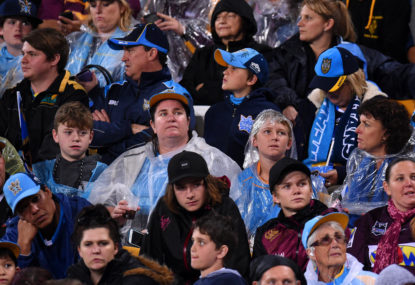I’ll admit it, I’m conflicted. I hate clickbait. I hate the constant ‘NRL in crisis’ narrative. The laughable ways the NRL is attacked day to day make both the competition and their attackers look amateurish, not to mention the immeasurable impact on the game’s corporate and social reputation.
But on the other hand, I know that the game needs to have people willing to challenge leadership and unearth the things people don’t want unearthed. That’s the existential purpose of journalism.
Journalists are supposed to hold power to account, to shine a light in the dark, to go toe-to-toe in the corridors of power and to explain to us, the people, what’s really going on.
That’s not what we get in our NRL coverage though. We are insulted daily with a stream of pining for the good old days (which at the time were horrible), arguing on behalf of vested interests, settling personal grudges or arguing two opposite positions simultaneously while keeping a straight face.
Us punters try to make sense of it all, trying to let it flow past while picking up on the occasional interesting piece which might actually provide some genuine insight.
But when I read something blaming lower State of Origin ratings on the referees, I buckle. Then less than two days later when the same lower State of Origin ratings are blamed on teenagers playing Fortnite, I start to despair.
There’s so much blatant agenda pushing that a lot of today’s rugby league content reads like parody and that’s not good – it buries any valuable, worthwhile information under a pile of sludge. (Because Buzz was right – not about the refs, about the teenagers playing Fortnite).
NRL ratings are down for Channel Nine and it appears the old school are blaming the audience rather than looking at how they need to adapt. That’s the public impression, anyway.

(Photo by Mark Kolbe/Getty Images)
Fox ratings are well up and the NRL are easily the most dominant sport on Australian pay TV. What’s the difference? Is it the commentary? Less constant complaining and unrelated in-jokes at the expense of the game unfolding? A more mature approach to the game?
You’d hope so, but it’s worth noting that Fox NRL is now showing symptoms of the same #refsfault disease that’s killing Nine.
Then there’s the NRL itself, now running a newsroom of its own. Mainstream publications don’t like it and it’s easy to understand why – far as they’re concerned, the NRL is taking their stories, making access to clubs and players tougher and leaving them with scraps like player manager-driven ‘redemption tales’ about players who have no business being anywhere near the NRL.
I think the folks at NRL.com do good things and work objectively, others don’t. You can make up your own mind on that.
For a good case study of where rugby league and sport coverage in general has landed, let’s look at Paul Kent. I’ll give him credit – he knows better than most what floats and what sinks.
Check the comments underneath his latest crisis tale, ‘No accountability from NRL in footballing crisis’. Readers split almost 50/50: mocking Kent’s constant crisis narrative, his logic and the man himself. But there was a lot of support. The piece clearly resonated with the section of NRL fans who don’t like the direction the game is taking.
If I’m the editor – that’s the sweet spot where I want my writers to be.
The world is changing, how we consume information is always evolving and how we measure journalistic success has changed. Kent has his craft down so well he’s comfortable calling NRL supporters ‘peanuts’, idiots on twitter with no idea what they’re talking about. He’s the conductor and we’re all in the orchestra.
Match reports and analysis, profiles and longer pieces are leaking away from mainstream publications, replaced by sensational hot takes that do the author’s reputation and credibility no favours.
The sad fact is this: when a story is assessed, it makes no difference whether we loved, hated, or were indifferent about it. In fact, is doesn’t even matter if we read it. All that matters is that we clicked on the link to get there or that we retweeted, shared or liked the post. And we’re all the worse for it.
I’m not alone when I say how sad it is to see people you grew up reading reduced to trolling for clicks, likes and retweets, but that’s where things are right now. An honest toiler changing clubs was once two lines worth of reporting. Now that two-line report becomes BOOM! #BREAKING: STAR/YOUNG GUN/FAN FAVOURITE ON THE MOVE.
We can’t act like we’re above all this, because we all contribute to it. We’re part of the cycle.
What does this all mean? I don’t know, to be honest. Controversy gets clicks, Kent is right when he says that. Me or anyone else saying ‘don’t click, don’t share’ is naive and pointless. We’re all to blame for where we are.
I want my rugby league journos to stop writing bullshit for clicks. But I also know I’ll get sucked in again. I know it.
I just wonder sometimes if these people don’t realise they’re gleefully sabotaging the controls of the aeroplane they’re flying in.






























































































